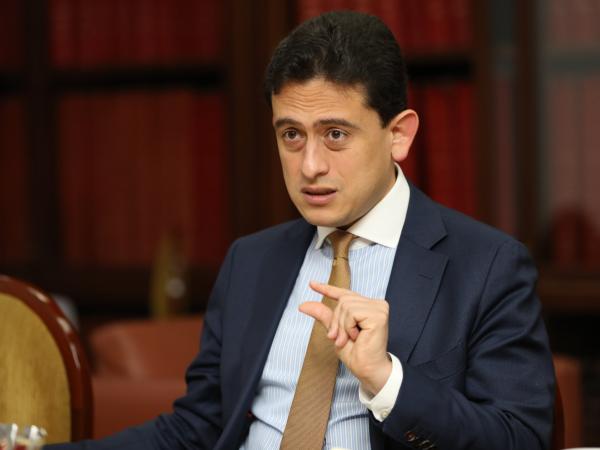The management of the Directorate of National Taxes and Customs (Dian) is key to him government of Gustavo Petro, not only for the tax reform approved last year, which is already operating, but also for the goal of raising close to $30 billion in the fight against tax evasion over four years.
The director of the Dian, Luis Carlos Reyes, spoke with Portafolio about some tasks in which the entity is advancing, such as the modernization of the systems, the creation of a universal declaration of income and the expansion of electronic invoicing.
(See: Do you have debts with Dian?: This is how you can request discounts in 2023).
In 2022 the collection exceeded $228 billion, how do you evaluate this management?
The collection exceeded the set goal and that has a lot to do with the beginning of the Dian modernization process. Apart from the recovery of the economy and a series of exogenous variables that had an effect, we do see the result of better management, due to the improvement of the systems and the strengthening of electronic invoicing, which is something that this year is already beginning to be mandatory at all points of sale.
Will all businesses have to invoice electronically?
All businesses will have to issue an electronic invoice at the point of sale. This obviously requires training of the merchants; the only ones exempt will be natural persons with ‘very small’ income, but all legal and natural persons obliged to keep accounts will have to issue electronic invoices.
(See: What are green customs, Dian’s commitment to transformation).
How many taxpayers will enter this obligation this year?
We have more or less 11 million transactions with electronic invoices, but by 2023 40 million transactions are expected. Many times people do not differentiate, the fact that a printed receipt is delivered at the point of sale does not mean that it is an electronic invoice, and that is what will become mandatory.
All those legal or natural persons who are obliged to keep accounts, will have to issue electronic invoices
Will this help prevent double billing?
Evasion and the fight against evasion are not static, they are dynamic and the task of the Tax Administration is always to go one step ahead. But we also hope that there will be a cultural transformation in which people are less motivated to find the trap. One message that we want to convey is that it is a saving for a business that sells contraband or that charges less without an invoice, it is money that is stopping going to aqueducts throughout the national territory, to health or education. And every peso counts.
Colombia has wide digitization gaps, what will Dian do to accompany this process?
In the National Development Plan we are already working to specifically meet the needs of those populations where connectivity continues to be a challenge. It is necessary to take into account the inclusion of different groups in the country, and not force them into a situation in which they technically fail to comply because it is an impossible norm to abide by.
The good news is that in areas where collection tends to be higher, we can already implement these measures without the need for exceptions and this allows us to ultimately strengthen the collection goal to strengthen spending.
The reform has already entered into force, but 2023 is a year in which a slowdown is expected, what does the Dian project in terms of collection?
Despite the fact that the economic forecasts could be more optimistic, and taking into account that no one has a crystal ball, we think that due to the changes we are making in the entity, the collection can increase substantially.
The Government and the Dian are going to begin a process of strengthening the Tax Administration. La Dian is summoned to a contest for thousands of new officials to enter. We are going to place great emphasis on hiring forensic auditors to examine income statements and all types of taxes with a magnifying glass. Many times the problem is that we are left with unaudited income statements. We want that when someone declares any type of tax, they have the highest certainty that an inaccuracy will be detected and it will have consequences that it is better not to look for.
(See: Dian collected $228.6 billion in taxes during 2022).
Last year close to 4.5 million people declared income, how many may be remaining without being audited?
Another of the great collection goals that the Government has for the four-year period is a control of important evasion. The idea is more than tripling the audit capacity.
The Government has collection goals to control evasion that are almost equal to those of the tax, how will it guarantee them?
Estimates of the cost of evasion are almost $80 billion annually. The government’s goal of tax collection was $50 billion, with the reform we are talking about an additional $20 billion entering, so our goal would be to be able to reduce evasion in a four-year process and thus be able to reach that additional message of $50 billion.
The tax administration has not been strengthened as much as it should be and we think it is totally reasonable to hit evasion that size.
Taxes.
The tax ‘gave Dian teeth’, how is it getting stronger then?
Well, there will be more resources, that’s important. In Colombia, the Dian has taxes and customs, and only has 11,000 employees, while the Korean tax administration alone has, for example, 20,000.
In terms of strengthening, there is a need to increase the size of the entity by thousands of people and we have a contest to incorporate 4,700 new employees. We are being retired between 600 and 700 people every year, they are people with very specialized knowledge and if we replace them with temporary employees it is problematic. We are seeking to establish annual contests to progressively renew the plant.
(See: Dian clarifies in which cases the RUT should be updated).
In technology, how will this modernization be accompanied?
The entity has the Dian fund, a US$250 million account that was created in 2018 and which is currently allowing us to finance the transformation of the entity’s technological systems. In this process we are acquiring the new software that will allow not only the tax receipt, but also all customs management to be carried out more efficiently.
In the next few days the National Development Plan will be presented, what measures will be promoted for the Dian in the project?
One of the things that the National Development Plan is looking at is articulating what we do with other State entities, taking advantage of processes that are already underway in the Dian to provide citizens with a better service.
One goal that is in the Plan, which seems extremely valuable to me, is that any payment that a citizen must make to the Government, or that a citizen has the right to have the Government make, can be processed from the same platform. Today we have the ‘Muisca’ system for income tax, for example, but contributions to social security must be made through a form, and on the other hand when payments are received from some type of monetary transfer from the DPS it is another system.
What has been discussed in the National Development Plan is a universal declaration of income, which also helps us to make all those payments through the same platform. What we are looking for is that this technological platform, which the Dian already needs, is used to provide support to the other State entities that receive payments from citizens or that make transfers to them, so that everything is much more harmonious and is a digital window .
(See: Deadlines for declaring and paying income, VAT and other national taxes).
I believe that none of the measures it introduces
the tax reform is not even close to generating inflationary pressures
This new platform for the Universal Declaration of Income, would it be managed by the Dian?
This is something that requires joint work from all entities, but the Dian has expressed its willingness to be the one to articulate these efforts. There are things in which we are able to do better than developed countries, we are in a process of digital modernization and we will take advantage to leave everything impeccable.
After the tax, how do you project the impact of taxes on the economy in 2023 and the decisions of companies?
The vast majority of companies in the country either will not see an increase in their taxes or will see a reduction.
In the simple regime, which the vast majority of companies in the country can take advantage of, lowered their rates in all categories, and is designed for small and medium-sized companies.
There are many companies that would benefit from being part of the simple regime in terms of effective rates and have not joined.
One of the things we want to do is to continue promoting this tax scheme, which, as its name indicates, has fewer procedures than the ordinary regime and represents a lower level of taxation for a significant part of the companies. And those who cannot take advantage of the simple regime, the vast majority, will not see any change, except for a small benefit that was the ICA income tax discount.
The debate centered around some sectors, to which it is very true that taxes were raised, but it was never sought to make these sectors leave the country. There is an overtax for the financial sector, energy mining, and electricity generation, which are simply sectors that can contribute more and that even in this new tax system continue to be an attractive and viable business option.
(See: Income statement: Dian specifies what his taxes are used for).
With regard to the consumer, new taxes have arrived for some companies. Could that generate inflationary pressures?
The issue, rather than saying whether it is being generated or not, is to talk about the magnitude of the effects. The economy is a very complex system and whatever you do to a certain degree has an impact on absolutely everything.
I believe that none of the tax reform measures is even close to generating inflationary pressure that is even noticeable in people’s day-to-day lives, much less a reason for concern in general.
Modernizing customs, another task
Among the plans that Dian has is, in addition, modernize the customs system. “The issue of customs is really behind in the country”, assured the director of the Dian, Luis Carlos Reyes, who announced that the system is based largely on “paper files”.
According to Kings, it is necessary not only to digitize processes, but also to rethink them and thus improve customs management not only in relation to smuggling control, but also to promote trade facilitation. He assured that this year the Dian will present a new sanctioning regime.
LAURA LUCÍA BECERRA ELEJALDE AND ÓMAR G. AHUMADA ROJAS
Portfolio Journalist and General Portfolio Editor

















